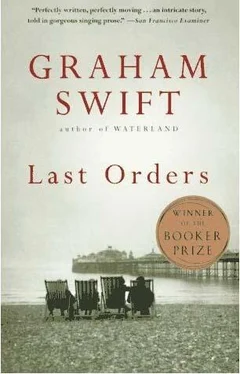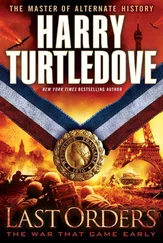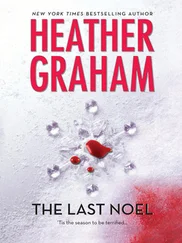I kept not looking at the name looking up at me from the middle of the list for the three five. Twenty-two runners. What's in a name? They call me Lucky. Only a fool bets on a name. And Jack can't be saved, he can't be.
I thumbed my notebooks, jotted some figures. Rule number one: value for money. But Jack don't want value for money, he wants a one-off winner to end all winners, to save his bacon, his fried eggs and bacon. He's not in the business of averaging out.
So this aint your regular sort of bet.
But I kept not looking at the name staring up at me. Rank outsider, twenty-to-one the field. Though it kept staring back at me. There's luck and there's luck. There's safe luck that keeps you from harm, that keeps bullets from hitting you or makes you live to a hundred and five, and there's wild luck that makes you grab at gold. There's the sums and there's the scent, getting stronger, and sometimes the scent is all there is, and you can tell all you need to know about a nag from the tilt of its head. It's like it's the bet that's the thing but sometimes it's just the run and the rush and the roar of the race. Sometimes it's just the glory of horses.
So I stubbed out my ciggy and lit up another and took a pace or two across the room like I couldn't sit still. I stood at the window. Back end of Bermondsey. And the track at Donnie a wide, flat gallop. You'd have to be a fool. I felt the flutter in my ribs and the luck in my veins. What you do it for in the first place, why you're in it in the first place. I opened the window like I was short of breath. I felt the air and the smoke in my nostrils and the life in my limbs and Jack's money burning a hole against my heart. Miracle Worker.
But it was easy to make a man smile in those days. Even that tallyman, Alf Green with his puffed-out chest, the sticks dangling from it, and his black tash and his stare like a sergeant-major's, watch out if your stick didn't tally, used to crack his face just a little bit for me, just a bit. Unless I imagined it. You'd think he might've stretched a point now and then, called six bushels seven. Me there by the bin in my thin frock, hot and sticky, and him with his notcher. Seven bushels the shilling-tally and you were pushing it to make two-and-six a day. Hard work, up at the crack. But don't tell me there weren't short cuts, and more than one way of collecting hop tokens. Shirley Thompson should've been a champion picker, tokens she had. Two hundred bushels the week, except it wasn't all bushels. She'd end up with nearly ten pounds' worth, not counting extras for cash. And her ma and pa in Deptford would be chuffed with her for the fiver she'd hand over. Our little Shirl, champion hopper.
And don't tell me that there weren't general compensations. Doing it for free, getting it for free, down there in the garden of England, with the sunshine and the fresh air and the haystacks and the hop-bines, and that feeling, though it was stay-put and keep-at-it work, bins all in a row, three or four to a bin like a factory outdoors, of being set loose. On the loose. Living in huts and tents like natives, living on the land, no fixed abode. No hawkers, no gypsies, no dogs, no hoppers. The smell of fry-ups at night. Wood fires, billycans, oil lamps, natter.
The gypsies came with their caravans and horses, needing the hopping just like us, but made their camp separately, over by the wood, eyeing us like we were the ones who'd pitched up where we shouldn't, and I used to envy them because they were a stage further at being outlaws than us and because they were professionals at it and we were just amateurs and when we were back again in Bermondsey, all bricked up and boxed in, the/d still be wandering the woods and lanes. I used to envy them their nut-brown skins, against our London dough, white turning red, like a barber's pole. I used to watch one of them lead his horse every evening to the pond for watering, just as us hoppers finished. Though no hopping for him, it seemed, city chits' work. Big feller. Bare-backed both of them, him and his horse.
I suppose you could say it was more than envy.
My mother said 'I never should'.
And I didn't, though I might Ve. I played with Jack Dodds instead, Jack Dodds from the other end of Bermondsey. It's a big wide world. And I don't know what Shirley Thompson did, what Shirley Thompson used, but she never got herself knocked up, but I did, first time of asking.
He was a muscle man too, a big man, even bigger, if not so trim. I don't mind admitting, that's how I liked 'em, or thought I did, big hunks of men. What more could a girl want than a big hunk of man? And I knew he had his eyes on me, down there on the next row of bins, I knew he had his feelers out. Whereas Romany Jim wouldn't grant you a glance, a flick of his head, not while you might be looking back. And Jack never thought it was man's work either, with those big hefty hands. Oh, all shrunk to the bone. Like picking flowers, he said. She loves me, she loves me not. Like counting buttons. I said, 'So what d'you come for?'
He said, 'Reasons.' And I said, 'So what d'you do when you're not picking hops?' and he said, 'Be telling, wouldn't it?' But someone whispered in my ear, when they saw how the wind was blowing, 'Butcher's boy,' and he gave the game away anyway when we took that walk, Sunday evening, round by the farmyard and stopped to look at the pigs, and he eyed 'em over like he was looking at something familiar from a new point of view, like he was weighing out sausages.
Like picking flowers, threading beads. But it was hops that brought us together, it was hop-picking that started it. The way your life gets fixed for you. Drink up, Vincey, have some more baby-juice. And it was pickings of another kind that clinched it. It's all pickings.
He brings round a bundle of newspaper with about two pound of runner beans wrapped up inside that he said he got from one of Wick's hands, though for all I knew he'd rifled 'em direct, and says did I want 'em? And I say, Yes, if he'll help me top and tail and string 'em, like I was doing him a favour. Uncle Bert and Benny were down the Leather Bottle, drinking hop-juice, spending tokens, leaving me to do supper, and he'd have been down there too if he hadn't also been spying out his moment. Runner beans. He said, 'All right.' So I went inside the hut and got a saucepan, two knives, a colander. You used to have to take everything like that, pots, pans, washtubs, the lot, like refugees. Then I went to the standpipe for water and came back and gave him one of the knives and only then did I flash him a smile, a real you-never-know smile, like a traffic light on amber. You never know how one thing leads to another.
Then I sat down on the hut step and spread the beans out on the paper on the grass in front of me and I put the saucepan down on the step beside me, deliberate, because there was room there for two. I said, 'There's a chair inside if you want it,' and he said he was all right sitting on the grass. Copping more leg. I tossed him a runner and I could tell he'd never strung beans before. He might've known how to chop brisket but he didn't know how to string beans. I said, 'This way.' Then I jammed the colander between my thighs so my skirt all rucked and tightened up. I said, 'Chuck 'em in here. See if we can't fill it.' Because I wanted him to see, I wanted him to know, if it wasn't plain as pie, that there was a bowl there, a whole bowl of me waiting. Unless he thought it was like a piece of armour. So we started filling the bowl. He aimed and he threw, rather than reaching across and dropping, and of course some of those bean slices started missing, some of them missed by a long way, some of them went down the front of my frock. It was an old cream thing with blue flowers on and buttons down the front. I suppose he was looking at those buttons, counting them. So we filled the colander. And I said, 'What next?' twisting a strand of hair around my finger. I said, 'Uncle Bert and Benny won't be back for a while yet,' the colander still between my legs. 'Unless you was thinking of joining them?' He said he wasn't thinking of doing that, looking at the beans. So I said, 'Wait there. You can take me for a walk.' Then I picked up the colander and stood up, shaking bits of bean out of myself, tutting, and I picked up the saucepan and took them inside and came out again, smiling, and he was smiling too.
Читать дальше












